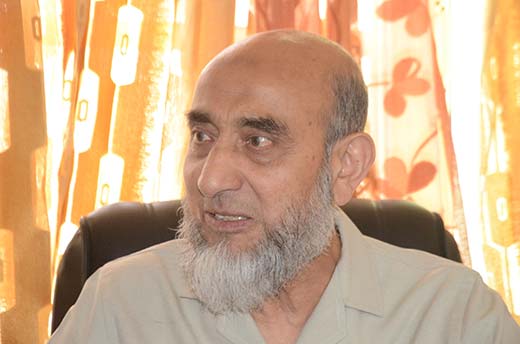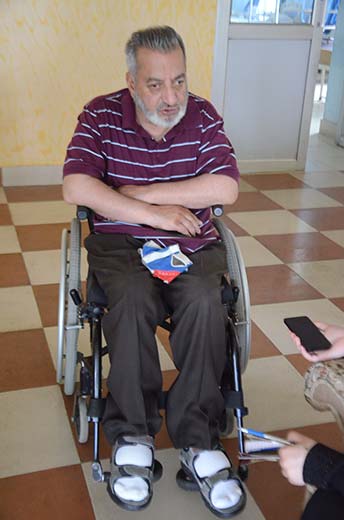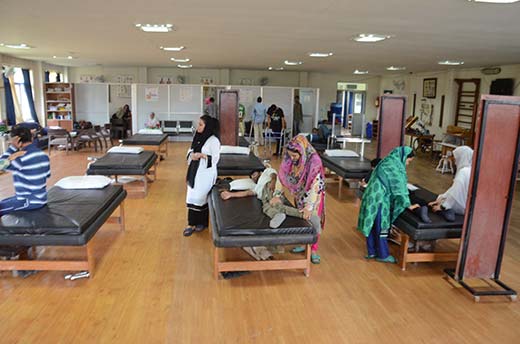Pained by the rejection that specially-abled face in the society, a few noble souls joined together to start Shafaqat. To help them face the world again, the group now runs a special school, a Spinal Injury Unit and an Artificial Limb Centre for them, Syed Asma reports
Lying on a bed, Zahoor Ahmed, 30, is staring at the ceiling: perhaps lost in his own world. After a while, his physiotherapist comes in. “It is time for exercise,” she blurts out. She assists Zahoor to move his legs gingerly. About a year ago, he had fallen from a walnut tree, injuring his spinal cord severely and paralysing his lower limbs.
Presently, he is admitted in ‘Shafaqat’ – special school for mentally challenged and multiple disabilities. Zahoor has been here for a few months now and is happy with the improvement his body is showing.
Shafaqat runs under Voluntary Medicare Society (VMS) – a socio-voluntary organization – established in 1970.

Before the accident, Zahoor, a resident of Sopore, was a cook [waaza] by profession. He used to earn for his five-member family – his parents and siblings, younger brother and sister.
Being bed-ridden, his family has started to stay away from him. They don’t visit him regularly now. Zahoor sustains his stay at Shafaqat from his own pocket.
Apart from a physiotherapist, Zahoor needs a consultation with a psychologist, informs Dr Ambreen Jan, Chief Coordinator of a rehab centre in Shafaqat. The doctors have noticed signs of depression in Zahoor which may lead to suicidal tendency.
“It is a normal phenomenon. A patient, if bedridden and rejected by his loved ones, is likely to get depressed,” feels Ambreen. “Zahoor is improving but his condition could have been better if treated on time.”

After falling from the tree, Zahoor was taken to SKIMS where he waited for three months without getting operated. Subsequently, he approached a private nursing home where he was operated. Later he was shifted to Shafaqat.
Before coming to Shafaqat, he was completely bed-ridden and couldn’t move, but now he is able to sit and manage to get to his wheelchair.
Shafaqat is one of the rare centres in Valley providing multiple facilities for specially-abled people under one roof. It runs a rehabilitation centre with facilities like physiotherapy, occupational therapy, assistive technology, speech therapy, sports and recreational therapy, vocational training, developmental therapy, psychological assistance, psychological assessment, gymnasium, Complementary and Alternative Medicine (CAM) therapy.
All these therapies are designed to help individuals become independent and confident so that they can live life without being a liability.
After 45 minutes of exercise, Zahoor had to meet his psychologist. This session helps patients remain optimistic in life. Zahoor says he is improving and plans to open up a small shop to scrape out a living.
The rehabilitation centre presently caters to twenty odd patients including men and women of all age groups. People fall from trees, bikers, divers, masons and carpenters are often seen in the centre, informs Ambreen.
The most common injuries among women stem from the ways they work at home where they usually fall from the ladders and stools while dusting, she adds.
Among a dozen people who are having physiotherapy consultation in the hall, there is a known face. Seith Rafi, a reputed comedian, is undergoing a three months long speech therapy. He had a stroke rendering a part of his brain dysfunctional. “There are a few chances that he may talk again,” Ambreen says.
The centre also caters to the patients with Parkinson’s diseases. Though, the percentage of such patients is low, one such is a sixty-year-old retired gazetted officer. His son leaves him in the centre early morning and takes him back at 6 in the evening. Dressed neatly and wearing a sports shoe, the old man is having his consultations. His therapist told him to keep his limbs busy. He gets up, takes a hockey sticks, a ball and starts playing around. “Don’t miss a shot,” orders his physiotherapist with a strict face.
It is noon and patients by now are busy in their activities. “This is what I wanted,” says Dr Mir Mohammed Maqbool, an ENT specialist and the President of Shafaqat. So far almost 1620 patients have been treated in the Centre.
After establishing a trust Dr Maqbool along with his colleagues used to visit far-flung areas and provides medical assistance to the people.
“Though I used to take my specialist friends [doctors] along my motto was to help deaf and dumb people, especially children,” says Dr Maqbool. “They need much more than a hearing aid.”
Organising medical camps in the far-flung area continued till 1989 but after the turmoil started, his visits to these areas were hampered. So, in 1998 he came up with an idea of establishing a special school, exclusively for the children, with mental and multiple disabilities.
Initially, Dr Maqbool, approached several organizations to solicit help for his initiative but sensing cold response, he eventually called his friends and acquaintances for raising funds. “Many of my family and friends are well-settled abroad, so I roped them in and we erected a structure with appreciable infrastructure,” says Maqbool. The school started in the year 2000.
In building up Shafaqat, Khursheed Ahmed Malik, a retired bureaucrat and the Vice President of the Trust, has played an instrumental role.
Establishing a Care Centre for spinal injuries which Dr Ambreen coordinates was Malik’s brainchild.
He was keen on starting a Centre because when he was confined to the wheelchair after a deadly accident in 1987. The injury was severe but he survived nonetheless.
Everyone cannot afford the treatment which demands lofty sums, he admits. Malik was treated in London and it was there he came up with the idea of building something similar in the Valley.
Malik is a retired IAS officer and says establishing Composite Regional Centre (CRC) was one of his efforts. “I was instrumental in approving that project with Government of India,” says Malik. For almost two years CRC was using the building and facilities of Shafaqat. Later the Union government lend them a piece of land near SKIMS Medical College, Bemina.
Malik and his associates thought the Central government has the potential to build an unparalleled infrastructure but the pace at which the government worked did not impress them. So Malik and Maqbool roped in their friends who are settled abroad to realize his dream project. Besides, they signed an MoU with the Indian Spinal Injuries Centre in New Delhi. Its architecture is somewhat similar to the care centre in London where Malik got treated. “While coming back I had got the map of the place along,” says Malik.
Though wheelchair-ridden, his life does not seem much affected by it. He roams around autonomously on his wheelchair and drives his customized car that he automates by hand.
Maqbool and Malik are planning to establish a new neuro-diagnostic centre on the premises.
Besides, the trust runs an inclusive special school for the children who are marginally disabled with various physical, mental, hearing or speech impairments. It also provides OPD consultation for similar children.
The students in the school are admitted after the professionals assess their mental status. “All of them cannot get educated. Depending on the component of mental retardation, we classify the children, some of them study and some are trained as per their talent,” says Bashir Ahmed, the administrator. “We tackle all impairments except blinds.”
Presently almost 64 students are entertained in the school. To give individual attention to the special children, the administration has decided to maintain a ratio of 1:4 between teachers and students.
The team also visits far-flung areas to spread awareness and facilitate rehabilitation. “We do roam around places to spread awareness. And if they need regular consultations we call them to Shafaqat centre,” says Bashir.
The team believes that in case of special children, parents need to play an important role and need to get out of the social stigma that these children are a liability.
VMS also runs an artificial limb section. The entire facility is funded by the International Committee of Red Cross (ICRC) and is offers free treatment to patients. The raw material for artificial limbs is dispatched from Geneva.
We handle 15 cases a month, says Parvaiz Bagdadi, who is heading the section.
Ali Mohammed, from Kupwara, is hopeful that Parvaiz will help his 10-year-old son, Altaf, to resume his normal life.
Altaf had a severe electric shock last year and doctors had to amputate his right arm. It is Ali and Altaf’s second visit. Earlier they had visited the centre to give measurements so that the artificial arm is properly locked. The artificial arm will help Altaf to at least pick things up with his hand.
After 20 minutes, Altaf walked out with both his hands in his trouser pockets. He was smiling.
















